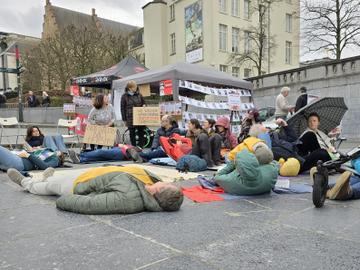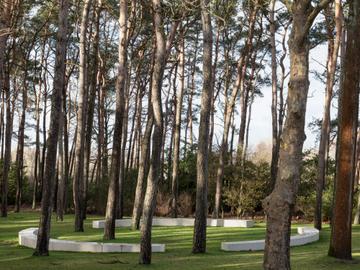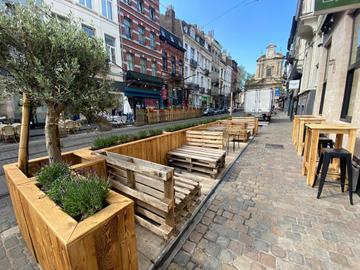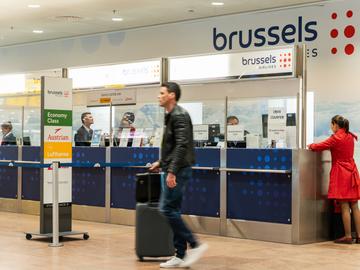The corona crisis is mercilessly ravaging the globe, and it does not discriminate. Everyone is affected by it in some degree, but visual artists now go out of the frying pan into the fire. A microcosm that was already barely holding together is now on the brink of implosion.
© Ivan Put
| Kato Six
WHO IS KATO SIX?
- Was born in Bruges in 1986
- Was admitted to the prestigious residency programme at Wiels in 2012, and later had residencies in New York, Berlin, and Clermont-Ferrand
- Had solo exhibitions at c-o-m-p-o-s-i-t-e and Komplot in Brussels, but also in London, Amsterdam, and Budapest, and her inspired sculptures, installations, and drawings were featured in group shows from Auckland, New Zealand to Mu.ZEE in Oostende
- At the end of 2018, she was one of the twelve upcoming artists in the exhibition “Generation Brussels” during the Brussels Gallery Weekend
- Info: www.katosix.be & Instagram
WHO IS TATIANA WOLSKA?
- Was born in Zawiercie, Poland in 1977
- She studied in Nice and London, and moved to Brussels several years ago, where she now resides at the Ateliers Mommen
- She is affiliated with the Irène Laub Gallery in Brussels, Galerie Catherine Issert in Saint-Paul-de-Vence, Galerie Claudine Papillon in Paris, and L’étrangère in London
- She has exhibited her drawings and sculptures made from found and recycled materials at Art Brussels, the Palais de Tokyo in Paris, Villa Empain and the Van Buuren Museum in Brussels, and the Museum Dhondt-Dhaenens in Deurle, among others
- Info: irenelaubgallery.com & Instagram
“Working as a freelancer and artist, I've had to get used to working in precarious situations, like many other cultural workers. But the current context of cancelled jobs until further notice has pushed me over my limits. I am therefore offering my drawings for sale. Please support me if you can.” The message that Kato Six posted on Facebook only one week after the first corona measures came into force cuts right to the core. Especially because the Bruges-born, Brussels-based artist appeared to be running an exemplary race – seen from the side-lines at least.
“I spent a whole day deciding whether I would publish that post,” the former Wiels artist-in-residence tells us on the phone from her studio in Brussels. “But because it soon became clear that the situation would not be solved quickly, I did it anyway. I know that no work will come in for the next two months, but perhaps those two months will become three or four or…”
SHOUT
Living in uncertainty is a daily reality for Kato Six, as it is for many visual artists. “My situation is always a bit precarious,” she confirms. “Under normal circumstances, two months is the maximum security I can count on. Furthermore, my own practice generates very little income. I occasionally receive grants, or I teach workshops, but I rarely sell anything – I am not affiliated with a gallery. This means that I have to find my income elsewhere, by making furniture, or plinths for other artists, or by taking on assignments for institutes or museums. That usually gets my income up to between 1,000 and 1,200 euro per month. But because that whole parallel area of my work is also dependent on the cultural sector, which is now at a complete standstill, I find myself in a situation in which I can no longer take care of myself.”
Over the past year, I often wondered whether it wouldn’t be better just to throw in the towel
Kato Six has no right to unemployment benefits or other forms of financial support. “You are simply not eligible for them if you work the way I do. And I know that there are many artists who find themselves in this position.” She has seen it in her own surroundings. “There is a deep sense of solidarity in the Brussels scene. I share a studio with seven other artists. Last week, we organized a video meeting to discuss each person's individual situation and to explore possible solutions. It feels good to be able to share these sorts of concerns with one another. The problem is that helping one another in very concrete ways is not easy because we are all in the same boat.”
We hear the same thing from Tatiana Wolska, a Polish-born artist who has lived in Brussels for several years, and who last year, in collaboration with curator Maëlle Delaplanche, produced one of the most exciting exhibition experiences of 2019. On the fringes of the art fair goliath Art Brussels, the duo created “Tell Me More about You”, a rare and wonderful project that was as human as it was artistic. It was an expérience totale in the symbolic context of the legendary artist village Ateliers Mommen – where Tatiana Wolska has been an artist-in-residence since the summer of 2018 – which drew scintillating energy from hospitality, encounters, acts of generosity, and sharing. “We wanted to establish an exchange of alternative ideas. To rehabilitate a dynamism that is oriented to solidarity.”
WORRY
Following several tumultuous years in the history of that more than 125-year-old utopian space for experimentation, exchange, and encounter, “Tell Me More about You” reignited the fuse with an intensely inspiring dream of different ways of creating, living together, and treating the climate. It is almost cynical that barely a year later, a virus that is raging across the globe is threatening to destroy not only that dream but also the economic race that seeks always more, against which that dream was reacting. “Everyone here is stressed,” Tatiana Wolska agrees. “We often talk about the crisis at Ateliers Mommen, in fact we were just talking about it yesterday. But we're all suffering. That offers some meagre consolation, but it doesn't get any of us anywhere.”
_Ivan_Put.jpg?style=W3sicmVzaXplIjp7ImZpdCI6Imluc2lkZSIsIndpZHRoIjozNTAsImhlaWdodCI6bnVsbCwid2l0aG91dEVubGFyZ2VtZW50Ijp0cnVlfX0seyJqcGVnIjp7InF1YWxpdHkiOjk1fX1d&sign=d991453264323e02d326a349010ed93f0eb775593bb416bedc863dd0f2cf3a94)
© Ivan Put
| Tatiana Wolska
Although Tatiana Wolska is affiliated with four galleries and she has exhibited at Art Brussels, Museum Dhondt-Dhaenens, and at the Palais de Tokyo in Paris, the current crisis has been exceptionally hard. “Very difficult, yes,” she tells us. “In April, I was due to exhibit at Parc(ARTS) in Sint-Lambrechts-Woluwe and at Art Brussels.” And the Drawing Now art fair in Paris, where she was to be represented by Galerie Catherine Issert and Irène Laub Gallery, has been postponed until the end of May. “I don't need much, enough to cover my rent and food is enough. I am normally able to earn enough with my exhibitions, workshops, and residencies, but now I am wracking my brain to figure out how I can even pay next month's rent. That is how acute the situation has become.”
“I am completely overwhelmed by the situation,” Tatiana Wolska admits. “I spent my life looking for solutions, and I have always managed until now. If I can continue to create my work, I'll be happy. I am angry, including at myself. I ought to have ensured that I had some security much earlier. I am a little otherworldly in that sense. At the same time, I am reticent to ask for help. I have only asked for help once, from the OCMW/CPAS. I was not eligible for support, they said, because I have no debts. So it simply wasn't for me, and I have never asked again. Perhaps that is partly my ego, but I found the experience horribly humiliating.”
TRUST
But there is more going on, Yannick Ganseman says. He is likewise an artist, but also a member of the executive committee of the NICC, the advocacy group for professional visual artists. “When you see how the Flemish government introduces measures for one group or introduces temporary redundancy compensation for another, and then parenthetically adds that it would be better for people not to request ticket refunds because the cultural sector is also having a hard time… Well, it's pretty feeble.”
I am wracking my brain to figure out how I can pay next month’s rent. That is how acute the situation is
“We are actually being forgotten,” Yannick Ganseman emphasizes. “Or perceived as a drain on subsidies. While only 1 to 2% of artists can live from their art and the average income in our sector is 12,700 euro per year. People stare open-mouthed when you tell them that, even though the numbers are all publicly available. Policymakers are still largely oblivious to how delicate the situation is. To the fact that artists are doomed to combine various jobs. Or the fact that it is almost impossible for many people to earn the 18,000 euro over 18 months that you need to be eligible for official recognition as a professional artist. And once you have that status, you are actually considered unemployed and you receive 1,000 euro per month. It doesn't get you very far. In other words, there is no real protection for professional artists.”
The French and German governments have already introduced emergency funds for the arts. Discussions are ongoing in this country. What the result of these discussions should be is very clear in Yannick Ganseman's mind. There should be an emergency fund as soon as possible. But something also has to change in the longer term: “There should finally be a proper status for artists that is flexible and that helps the right people, and that is not simply an extension of unemployment. A status that works in the same way as the project subsidies: you submit a dossier and it is judged on its artistic merit. Based on the model of the Dutch Mondriaan Fund, which ensures that artists have an income for a few years. No questions asked, simply based on trust in their abilities. They don't have to be enormous sums of money; the compensation just has to ensure that you can still pay your rent if you go through a dip.”
ASK!
One thing is certain, namely that the current model is untenable in ordinary times. And that has only been reconfirmed in these extraordinary times. Because the situation is dire when the creators of thoughtful, vulnerable, and inimitable oeuvres like Kato Six or Tatiana Wolska feel compelled to stop. “At a certain point, the situation gets so precarious that you become scared of what the future will bring,” Kato Six admits. “And it makes you start doubting. Over the last year, I often wondered whether it wouldn't be better just to throw in the towel. I've noticed that I have to keep working harder and harder just to make ends meet. And after a while that has an adverse effect on your artistic practice. The question is simply: where is this going? Because sometimes you get very little back. Surely after ten years, you ought to have been able to find your place somewhere. And when that place is questioned, by society, by the political class, or by whoever, things become very difficult. The visual arts need recognition and support, otherwise they can't survive. That's just the way it is.”
There is no real protection for professional artists. We are actually being forgotten
Perhaps our perception of art should also change. Our present moment might be a catalyst. And maybe it can also change the way we cherish and foster our artists. “All too often, as artists, we dangle at the bottom of the hierarchy,” Kato Six says. “It happens often and constantly anew that we take part in exhibitions for which there isn't even a budget or a fee. They can give you visibility, but actually it is so wrong. Especially when things could be different. They abolished that practice in Ireland, an artist friend told me.”
It is not yet an absolute law, Kato Six informed me after our call, but the campaign called “Ask! Has the Artist Been Paid?”, set up by advocacy organisation Visual Artists Ireland, did apparently manage to empower artists to ask whatever arts organization approaching them to do a show: what are you going to pay me? Just like audiences can ask organizations what they pay artists. To ensure that it is not only the curator who is on a wage and the technicians are on a daily rate, but that artists get something too. That naming and shaming might be a good start. Let it spread like a virus.
Read more about: Expo , coronacrisis , Kato Six , Tatiana Wolska , Yannick Ganseman




Fijn dat je wil reageren. Wie reageert, gaat akkoord met onze huisregels. Hoe reageren via Disqus? Een woordje uitleg.